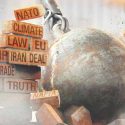Something is rotten
 Shutterstock/Gavrilov Yan
Shutterstock/Gavrilov Yan A call for a broader – and more grown-up – definition of corruption
Twenty-five years after the birth of the global anti-corruption movement, it’s time to grow up. While the community nourishing the movement may be mature, the underlying framework for understanding corruption is not, and its immaturity is fostering global security risks.
The modern movement arguably began with a historic speech in 1996, in which World Bank President James Wolfensohn called out the “cancer of corruption” and demanded global action. In the following decade, energized by US support, European scandals and donor pressure, international anti-corruption agreements proliferated, including the InterAmerican Convention Against Corruption (1997), the OECD Anti-Bribery Convention (1997), the Criminal Law Convention Against Corruption (1999), the African Union Convention on Preventing and Combating Corruption (2003) and the United Nations Convention Against Corruption (UNCAC) (2003). In rapid, almost frantic form – following years in which corruption was treated as a second-tier issue – something like a rough consensus on global corruption emerged.
Achieving consensus in the face of divergent traditions and laws was no easy task. To manage this challenge, the international community converged on an extremely narrow understanding of corruption, one that revolved around egregious acts, like outright payments to government officials in exchange for contracts. This narrow approach extended to the consensus vision of what constitutes effective anti-corruption prevention. The demands on member countries were vague, and the action items tended toward transparency and intergovernmental cooperation. At the same time, the anti-corruption movement also embraced criminalization and transparency, instead of structural reforms, as the tool of choice. The UNCAC, for instance, the only binding multilateral agreement governing corruption, requires that signatories criminalize certain forms of bribery.
In the early years, there were reasons to be bullish about the successes of the anti-corruption movement. It led to strong expectations in terms of transparency. The new global consensus changed priorities and provided morale and support to domestic anti-corruption activists. Furthermore, it ushered in a new lens with which to understand domestic and global challenges, and allowed people to see the pernicious impacts of corruption as well as the threats that corruption poses to security, stability, prosperity and freedom.
Even the focus on the flagrant forms of bribery and money laundering seemed promising, a gateway into addressing grand corruption and institutional breakdown. Inasmuch as the most egregiously corrupt countries were infected by a blend of cancers – petty and bureaucratic and institutional – the different phenomena seemed like they might be foundationally related. Something akin to the broken-windows model of policing developed. If only we could get countries to crack down on police officers shaking down citizens, and companies bribing foreign officials, perhaps it could lead to a shift in norms and expectations, and then countries will crack down on kleptocracy, too.
But the easily achieved consensus also raised warning flags. Why was Russia willing to sign the UNCAC and the OECD Anti-Bribery Convention? Why has the UNCAC been ratified by 189 signatories during a time of rising global corruption?
The Russian example, and the disastrous international results of its corrupt systems, highlight the fatal weaknesses of the current system. Putin may be happy to boast that Russia has signed on to the UNCAC and he can do so with little or no ramifications, as the UNCAC is riddled with vagueness and nonmandatory language. Moreover, like many authoritarian regimes, Putin is all too happy to leverage anti-corruption rhetoric in protecting his power, while using the criminal laws against corruption in his country to imprison opponents.
The global anti-corruption movement, as epitomized by the UNCAC, is stymied by three weaknesses: its formalism, its focus on individual acts and its preference for criminal law. By focusing on those who wield formal power (elected or appointed offices) instead of those who wield governing power, the UNCAC implicitly exculpates private parties from the charge of public corruption. The instrument relies on a state identifying formal obligations and then punishing their betrayal, a structure that can lead to knotty questions when different states have very different formal roles. By focusing on individual acts as the apex of corruption, it encourages actions against petty bureaucratic forms of corruption, instead of grand and institutional corruption. And by focusing on criminal law, it endorses the most corruptible of the anti-corruption tools: selective prosecution.
In short, there is a real risk that if the global anti-corruption movement continues down the same path it has followed for 25 years, it will undermine global security.
For a mature approach, we need to look back a few thousand years to Aristotle. The approach he suggests is functional, not formal; systemic, not individual. It is agnostic on the particular form of government, focusing instead on the use of governing power, whether it is formally held or just functionally held. The rule of one he describes as either monarchy or tyranny; the rule of a few as either an aristocracy or an oligarchy; and the rule of the many he denotes as either a polity or mob rule. The fundamental difference between the good and corrupted government, according to Aristotle, lies in the psychological orientation of those who govern: Corrupt governments are selfish; ideal governments seek the public good. Explaining the difference between a tyranny and a monarchy, he writes: “The tyrant looks to his own advantage, the king to that of his subjects.” A tyrant is a king who “pursues his own good”; an oligarchy is an aristocracy that pursues its own good; and mob rule is a publicly governed polity whose constituent parts each pursue their own selfish interests.
For those accustomed to the formalism that has infected political theory for decades, this can sound almost impossibly soft. Psychological difference! Can we really base an international regime on the unknowable orientation of people’s hearts? And inasmuch as a mature approach is rigorously anti-formal, and more functional about power, can we really base an international regime on those who govern, as opposed to those entrusted with governing power? If we accept that private actors (think large transnational corporations) can engage in public corruption when they wield governing power selfishly, how will we determine when they are governing and when they are not?
The answers lie in shifting from trying to identify individual corrupt acts, to insisting on structures that don’t incentivize them. Instead of hunting down individual criminals, we need to hunt down systems that enable corruption.
Under a mature approach, which would encompass what is sometimes called institutional corruption as well as explicit bribes, we would pursue a structural, prophylactic approach, one that focuses on disabling centralizing power and conflicts of interests. In other words, it would highlight problems of concentrated private power and monopolization, as well as campaign-funding regimes and media-funding regimes. Anti-monopoly law would be part of such an approach, because intelligently structured competition makes it harder to capture any institution. Corruption in more decentralized systems may still exist, but it doesn’t threaten global security in the same way and is easier to address.
A mature approach recognizes that corrupt systems are not just a collection of individual corrupt acts, but involve networks and interconnected systems, private and public entanglement, payment systems that flow in multiple directions, and engage multiple arms of a government. A corrupt governing regime like Russia’s depends on concentrated power with its attendant systems of disciplining dissidents and whistleblowing.
The challenge with the mature approach – and the reason it is so difficult – is twofold. First, it will implicate elites and powerful companies that thrive in the current environment. Second, it does not lead to the same reforms in every country, because the methods of appropriating governing power for selfish ends are so various. One of the great corrupting methods of English royalty in the 18th century, for instance, was offering paid civil service jobs to parliamentarians in exchange for their loyalty; how could the reformers of that era have anticipated that corporate spending around campaigns on social media would be one of the great corrupting methods of 21st-century America?
A mature vision will doubtless mean fewer widely ratified treaties. So why not just stick with the narrow and the clear, given that it will likely be impossible to achieve consensus, let alone a broad agreement across major powers? The US trajectory over the last 40 years should be a warning to the global community about what can happen if you embrace a narrow vision.
While the US has always had a problematic campaign-financing system, where private donors can buy influence by paying for campaigns, it became much worse in the 1980s, when the Supreme Court began striking down a series of essential prophylactic anti-corruption laws. For instance, it deemed unconstitutional laws that capped the total amount of money a donor can give to candidates around the country. In Citizens United v. Federal Election Commission, it struck down laws that banned corporate spending in elections. The Court did so on the premise that these laws weren’t really anti-corruption laws. The Supreme Court redefined corruption to mean only quid pro quo corruption, which it defined as explicit exchanges. In other words, the Supreme Court took a broad tradition and squeezed its value out of it, leaving the country with an official definition that is quite narrow – but that aligns perfectly with UNCAC.
As a result, according to every new Corruption Perception Index and every observer of democracy in the US, American democracy is becoming more fragile and weaker in the face of corrupting influences.
The US experience also shows how thin a reed criminal law can be. Beginning in 1999, and continuing through several of its decisions, the US Supreme Court has repeatedly hollowed out the content of criminal bribery laws, largely because of a perceived risk that they are insufficiently clear and threaten legitimate political activity. The remaining tools are strong according to standards of international law, but reach only the most heavy-handed, unsophisticated operators. Few would argue that greater enforcement of these blunt instruments alone would lead to substantial change.
Everyone in the anti-corruption community knows that the implications of corruption go much deeper than anything that can be formalized and ratified in a treaty. China funnels billions of dollars to companies in return for political favors. This leads to many problems, including that we cannot trust that statements by those companies represent their corporate interests, as opposed to the interests of the People’s Republic of China. At the same time, lobbyists representing foreign countries donated $33 million in US elections in 2020; we expose ourselves with a system that dangerously privatizes and destabilizes diplomacy, but lies comfortably outside the confines of the global consensus around corruption. The weakness of US and European institutions to lobbying and campaign contributions may tempt countries like China to more aggressive actions, just as Germany’s exposure to Russian energy power tempted Putin to invade Ukraine.
The Latin root rumpo means “to break, shatter, burst open, destroy, violate,” and the Latin root co means “with.” Corruption, the scourge of all governments, democratic and autocratic, represents the disintegration and destabilization of an institution from within, the dangerous deterioration of an institution’s own. The favorite historical metaphors for corruption are those of decay and rot, and for good reason, as like a rotten apple, a corrupt system has the power to spread from one institution to another, and from one country to another. The risks are clear; corruption destabilizes countries, regions and the world and leads to rising violence and civil war; it enables invasions like that of Ukraine; and it radically exacerbates inequality. It demoralizes. And when a corrupt system becomes strong enough, it destroys free and open discourse.
It will take a new – and old – framework of understanding corruption to slow it down.
Zephyr Teachout is a professor at Fordham Law School and the author of several books, including Corruption in America: From Benjamin Franklin’s Snuff Box to Citizens United, Harvard University Press.




